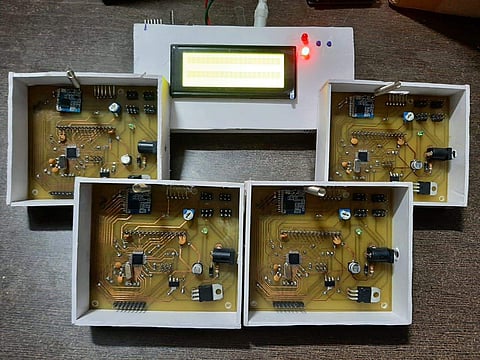

Waste management is a undeniably a serious issue in India. According to World Bank data, India produces a whopping 277.1 million tonnes of waste annually. Therefore, it is not a shocker that most dustbins found in Indian cities are usually filled to the brim for days before they are cleared out by municipal workers. It is this problem of waste management that students of Lovely Professional University wanted to solve through an automated system that will alert the authorities when a bin is full and in which location. They can immediately visit the location and clear out the waste.
Developed by fourth-year Electronics and Communications Engineering student Prabin Kumar Das along with PhD scholar Shaik Vaseem Akram, the device works on through radio frequency and doesn't need an internet connection to connect to the central system. "We have ensured that the device works in rural areas too where the internet connection might not be as strong," says Prabin. Explaining how the device works, Prabin says, "The device is placed with the dustbin and when the dustbin is about to be filled to the brim, it alerts the central monitoring system about the percentage of waste in it. A garbage truck will also be alerted at the same time and showed the location of the bin and also the best route to reach it." The device uses a geo-mapping feature and can work offline.
But that is not everything the device does. Prabin says that they have ensured that waste disposal is also contactless. "Whenever someone comes near the bins to throw waste, the device makes the flap lift automatically. We have used infrared technology for this purpose. To determine the depth of waste in a bin, sonar technology has been used," explains Prabin. He says that using radio frequency has made the devices quite effective, reliable and secure. Prabin and his team, which was mentored by Dr Lovi Raj Gupta, Dr Anita Gehlot, Dr Rajesh Singh and Paramveer Kang from the university, have developed a radio-based network for this device to work. Currently, it is being piloted at the LPU campus and Prabin says that such a type of system is best suited in places like public parks, government buildings, hospitals, university campuses and other public places.
Prabin has been staying on campus since last year, right from the beginning of the lockdown. Since then Prabin has been working on several project and he only started working on this device along with Akram from February this year. Speaking about his future plans with the device, Prabin says, "The device has currently received the patent grant from the India patent office. We are also looking at industry partnerships to develop this device at a larger scale." Prabin estimates that the device will cost around Rs 35,000 when it is mass-produced.
